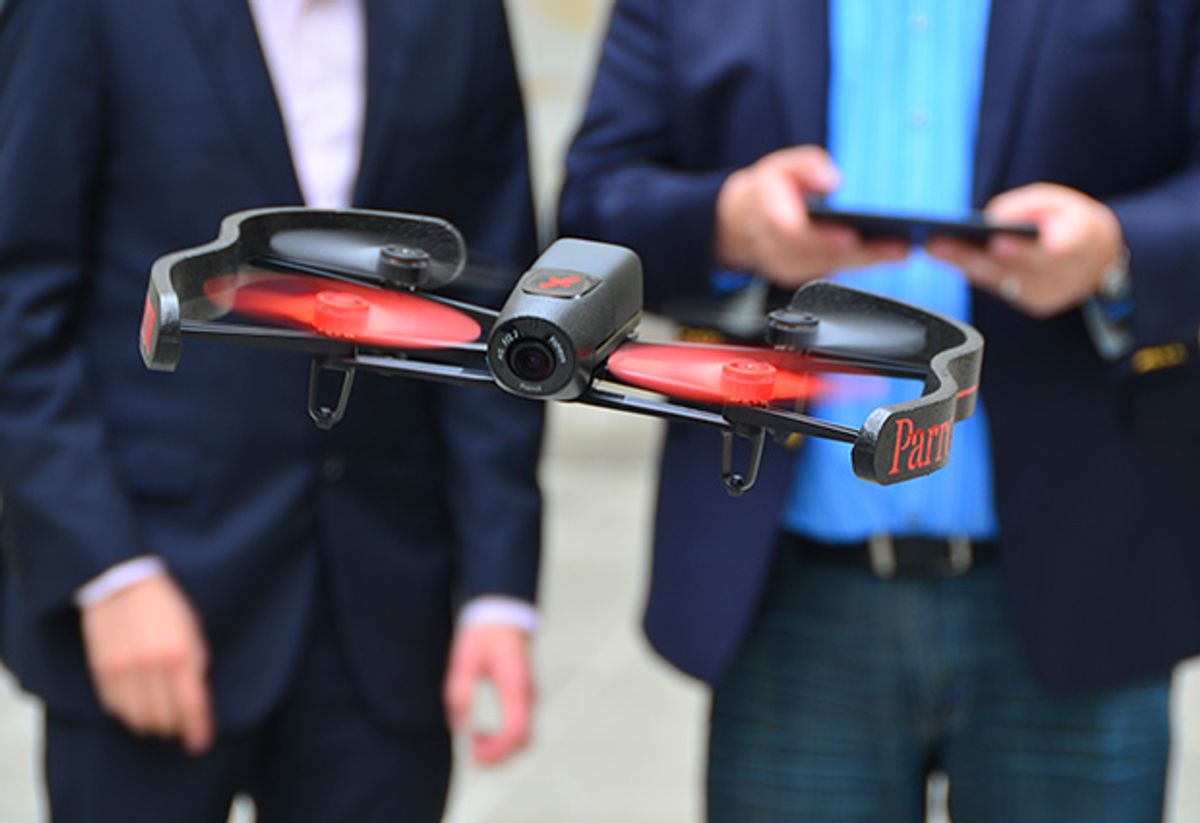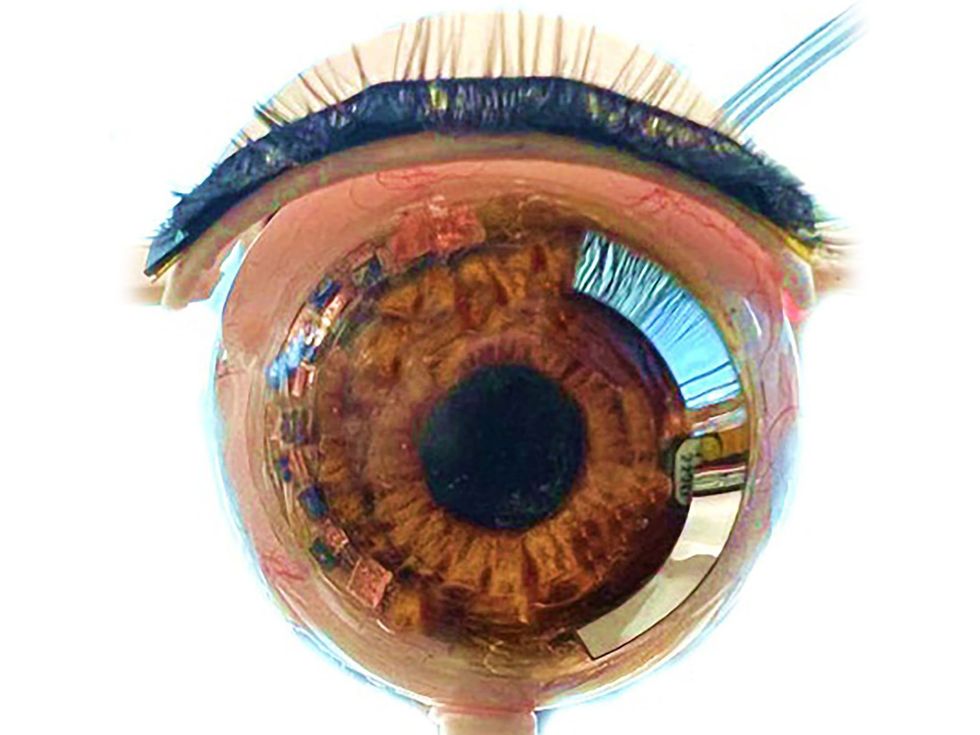During a press conference this afternoon, the U.S. Department of Transportation announced the creation of a task force to develop recommendations for a registration process for drones that operate in U.S. airspace. By 20 November, the task force will decide which drones will have to be registered and which drones will be exempt, whether you have to register drones that you already own, and how to deal with drones that you build yourself, among other things. The idea is that some sort of system will be in place by mid-December to deal with the million or so new drones that consumers will be getting over the holidays.
Here are the most informative bits from the U.S. Department of Transportation's press release; if you’d like a little extra meaningless PR babble you can read the entire thing here.
WASHINGTON – U.S. Transportation Secretary Anthony Foxx and FAA Administrator Michael Huerta today announced the creation of a task force to develop recommendations for a registration process for Unmanned Aircraft Systems (UAS).
The task force will be composed of 25 to 30 diverse representatives from the UAS and manned aviation industries, the federal government, and other stakeholders. The group will advise the Department on which aircraft should be exempt from registration due to a low safety risk, including toys and certain other small UAS. The task force also will explore options for a streamlined system that would make registration less burdensome for commercial UAS operators.
The task force may make additional safety recommendations as it deems appropriate. Secretary Foxx directed the group to deliver its report by Nov. 20.
Here's some additional information that we learned from the press conference, starting with the punchline, from Secretary of Transportation Anthony Foxx:
“Clarifying that federal law requires the registration of all aircraft, including unmanned aircraft, is essential to ensuring accountability, and is an important part of our ongoing vigilance on this issue. This is a safety authority the FAA has, and it's one that we're exercising.”
All means all; there may be exceptions, but the DoT wants to make it clear that any craft that flies through the air falls under the FAA's authority. The end. They can't make users get drone flying licenses, but they can make users register their drones.
“The details of this new registration system will be developed by a task force consisting of government, leaders, and a diverse group of stakeholders who will work on a tight deadline to get this work done.”
There aren't many details yet. The DOT knows what kinds of things it wants, namely a way to connect a drone with a user. But it's not exactly sure how to implement this, or what the registration should be applied to. The task force is supposed to figure all of that out, although it sounds like the members aren't finalized yet.
“We will create a streamlined registration process for all small drone users.”
What "streamlined," "registration," "small drone," and "user" means has yet to be determined.
“Registration will reinforce the need for unmanned aircraft operators, including consumers and hobbyists, to operate their drones safely: it's really hard to follow rules if you don't know what the rules are, or if the rules apply to you. Registration gives operators the opportunity to learn the airspace rules before they fly.”
This is a fair point: at the moment, a new drone owner has no particular reason to educate themselves about existing drone rules unless they go out of their way to do so, and compliance with those rules is voluntary, with no clear consequences for ignoring them.
“Registration will help us enforce the rules against those who operate unsafely, by allowing the FAA to identify the operators of unmanned aircraft. Clearly identifiable information that helps us point back to the user is going to be critical. We can take enforcement action as necessary to protect the airspace for everyone.”
Rules are only useful if there are consequences for breaking them, and if you can't identify the person operating a drone, you can't enforce those consequences. However, we don't yet have any details on exactly how that's going to be accomplished, and while Foxx seemed optimistic that many if not most consumers would do the right thing and register their drones if they know they're supposed to, there's no way (at the moment) to force anyone to do anything besides threatening penalties for getting caught.
“People registering their drones will be exposed to the rules, and the reasons for those rules.”
This seems to suggest that registering your drone might involve some kind of online process where you might have to answer some questions about what you are and are not allowed to do with your drone, such that a successful drone registration means that you show understanding of the rules governing its use. Not a terrible idea.
“We also want to ramp up on enforcement.”
The only details we have on this is that the DoT will be partnering with local authorities for enforcement. It's too early to know what enforcement will consist of, what kinds of penalties might be expected, or anything like that, but it seems like the only way the penalties will actually be enforced is if you register your drone, do something stupid with your drone, and then crash your drone in such a way that someone picks it up, finds the registration, and then goes after you. There aren't going to be mandatory transponders or geofencing or anything like that: catching someone misusing a registered drone will require finding the registration number on that drone.
“There's still a lot of work to do. This is not the whole solution, this is just a part of it, and the task force will be charged with answering a number of critical questions.”
I'd love to hear more about the whole solution, but that may or may not happen by mid-November.
“The FAA's ongoing work to quickly and efficiently integrate unmanned aircraft into the national airspace will continue, and will not be slowed down by this effort.”
That's good, I guess, and the FAA is still apparently on track to finalize its small UAS rules by June of next year.
“It is my hope that the task force will complete its recommendations by the middle part of November, with the goal of having some rules in place by the middle part of December. We feel that the level of urgency here is sufficient to move as quickly as we possibly can.”
Clearly, the DoT wants to have something on the books before the holidays, but I can't imagine that there will be any way for them to implement a point of sale or manufacturer registration process, leaving registration entirely up to the consumer.
“One of the things that this task force will look at is what sorts of provisions should be made for people who already own drones, and that's a recommendation that will be forthcoming from the task force on how to deal with that. But we would expect retroactive registration. There may be a grace period. The task force will have to come up with a solution.”
Well, that's going to suck. When pressed, Foxx would not comment on the specifics of enforcement on this (or anything else).
Some of the other speakers at the press conference offered a few more details:
Rich Hanson
Government and Regulatory Affairs
Academy of Model Aeronautics
“Registration of certain UAS that meet an appropriate threshold of weight, capability, and other safety factors makes sense." …"[Some of] these devices are virtually toys, that pose little or no risk, have minimal capabilities, and have extremely short lifespans. The challenge, therefore, will be striking the right balance when setting the criterion threshold for registration at an appropriate and effective level.”
The suggestion here is that there may be significant exemptions for small drones that could be classified as toys. It may be a weight limit, or range limit, or a limit on autonomous capability, but it's good news that not every picocopter may need to be registered with the government.
Captain Tim Canoll
Air Line Pilot's Association
“[A registration component] will not only allow authorities to immediately identify the owner [of a drone], but will also drive home the seriousness of operations of these UAS.”
This is true if the drone has a registration marking on whatever piece of it you happen to find after it does something bad, and if that something bad is not an accident, I'm not sure why the operator wouldn't just remove the registration marking beforehand. And this doesn't really address the issue of drones that people build themselves.
Clearly, there's a lot that we don't know at this point. And just as clearly, there's a lot that the Department of Transportation and the FAA don't know at this point either. It's hard to say how effective mandatory drone registration is going to be, and without a system that starts with manufacturers and (somehow) includes drones that people build from scratch, it's going to be a very hard thing to enforce. We agree that it's important to educate drone users about where, when, and how it's safe to fly, and it seems like the DoT has decided that registration is the best (or perhaps only) way to make sure that people take these rules seriously. They may be right, but that doesn't mean that this system is going to work.
Evan Ackerman is a senior editor at IEEE Spectrum. Since 2007, he has written over 6,000 articles on robotics and technology. He has a degree in Martian geology and is excellent at playing bagpipes.



